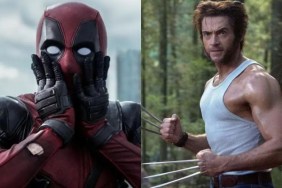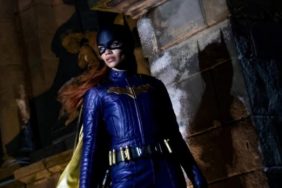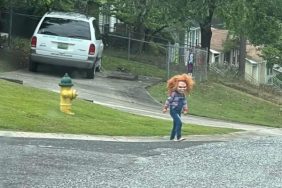Ruth Wilson is a revelation on BBC’s “Luther,” where she plays a dangerous sociopath with strange feelings for the morally conflicted title detective. In The Lone Ranger, her first starring role in an American movie, she plays a frontierswoman in love with Armie Hammer’s hero, but married to his charismatic brother, played by James Badge Dale. I spoke with Ruth Wilson in Santa Fe, NM about her efforts to turn Rebecca Reid into the kind of heroine who fights back, why she doesn’t have any scenes with the film’s biggest star, Johnny Depp, and the back story of her heroine that didn’t get much screen time.
The Lone Ranger is in theaters now.
CraveOnline: I’m sure you get this all the time, but I loved you in “Luther.”
Ruth Wilson: Aw, thank you.
That is such a strong character, in a way that is so rare to see on TV, let alone played by a woman, considering just how unusual she is. What was your thought, when you took The Lone Ranger, on sort of the legacy of female characters in that genre? Were you familiar with that genre?
Yeah. I watched a lot of films when I got this job and for me, it’s always important like you say, trying to find a strength in the characters that exist, trying to represent women in a way that I would like to be represented which is with a strength of character and has a grit. With The Lone Ranger, of course there’s that sort of stock character of the damsel in distress. The woman who’s left, or dragged around by the hair…
Tied to the railroad tracks.
Tied to the railroad tracks and at the will of men. And for me, I said to Gore [Verbinski] and Justin [Haythe] when I first started, I actually asked Gore if I could meet Justin and have discussion with him, or just talk to him and ask, “Is there any chance we can get a bit more…. Can I slap back, at some point?” There were lots of moments where I felt that Rebecca was the victim, and I wanted to hit back. I said, “Because I would, and I think it’s more interesting. You know, it gives a different dynamic to the piece.” So we got a few slaps and spits.
I think it was a journey of her developing and also, the complexity of this character being torn between two men. I hope that was an interesting dynamic, which you don’t necessarily see, but it’s the idea that she could have had something else. She could have had an easier life. She should have been with a different man, and the man that she chose was perhaps exhilarating and dangerous and exciting, but the man who was good and more like her is the man that left or went off and is kind of unrequited love. So, I think all those elements for me were really important to feed in and make it more complex, more sort of detailed, than just simple damsel in distress who is at the will of these men.
You only have a few brief moments with James Badge Dale, and a lot of your back story with Armie is just that, back story. What did you talk about? Did you come up with sort of an elaborate story?
Yeah. Yeah.
Can you tell me where she came from?
Well, Gore was really insistent. We sat down at the beginning and this was the heart of the story, this triangle. If this didn’t work, the film sort of failed a bit. Well, it would have failed if you didn’t believe this three-way love story. It was pivotal to the kind of journey of The Lone Ranger and what happens in it, so we all sat down and decided there was this idea that they knew each other, growing up. They were families that lived in the same area and they always hung out together, the three of them. So there’s a familiarity and a love between them, a bit like Dawson’s Creek. It was kind of that relationship.
Which one were you? Were you Michelle Williams, or Katie Holmes?
I think I was Katie Holmes, probably. I don’t know, I mean Michelle Williams I would kind of be, but it was probably in that sort of threesome. [Laughs]
No, no. Whoever you want.
So, we were saying they were kind of friends and they grew up together. Intellectually, she always got on better with John, was kind of more akin with John sort of sensibility-wise but James Badge Dale’s character, Dan was the more exciting, older, slightly cooler you know, dangerous one that was more exciting for Rebecca. We believed that John went off. They didn’t get together before John went, but John went off to train as a lawyer.
And Dan just swooped in.
And Dan swooped in. In that time away, when John was away, what else was Rebecca to do? She didn’t know when John was coming back and Dan was there. Dan was staying there, she was staying there, so that was the idea. That was what we wanted to feed into the whole thing, so we wanted to get that sort of dynamic.
What do you think Rebecca means to Tom Wilkinson’s character? He’s very adamant about “getting” you, but I feel like…. I never quite understood exactly, besides the fact that you’re awesome, I never quite exactly knew what you represented to him. Did you talk to him about that?
Yeah. We discussed the idea that the Latham Cole character wasn’t necessarily impotent, but certainly wanted to have an heir to his throne, so it wasn’t about me as such. It was more about the child.
Oh, interesting.
He has to get the child through me, so it’s almost like he does want the family. He wants to pass on the legacy, so when talks about, “This could all be yours,” to the kid about the train and “This could all be yours,” and actually, the idea of corrupting that child and corrupting the next generation into wanting money and greed and power, it wasn’t so much about the woman but she’s certainly the access to that child. So, he wants the image to go alongside the money and power. And that’s what those two represented, and she’s a strong…. She was the girl that everyone in the village knows of and likes and people are attracted to. Bill says, “Why is it these men get so hot under the collar for you?” There’s something about her.
Have they seen you? Think about it. “Why do they get so hot under the collar for her?” Have you seen her?!
Thank you! Exactly!







